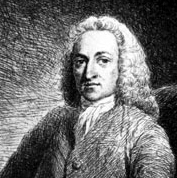Gowin Knight facts for kids
Gowin Knight (born September 10, 1713 – died June 8, 1772) was a clever British scientist. He was a physicist, which means he studied how things like energy and forces work. In 1745, he found a way to make steel super magnetic. This was a big deal! He also became the very first main librarian for the famous British Museum.
Contents
Gowin Knight's Early Life and Education
Gowin Knight was born in a small village called Corringham. This village is in Lincolnshire, England. He went to school at Leeds Grammar School. Later, he studied at Magdalen Hall, Oxford University.
University Studies and Becoming a Doctor
Gowin Knight earned several degrees from Oxford. He got his first degree, a BA, in October 1736. Then, he earned his MA in June 1739. Finally, he received his MB degree in February 1742. After finishing his studies, he moved to London. There, he worked as a doctor.
Knight's Amazing Magnetic Discoveries
In 1745, Gowin Knight made a very important discovery. He found a special way to make steel incredibly magnetic. This was a huge step forward for science!
Knight used his new magnetic steel to create better compasses. These new compasses were much more accurate. They helped sailors and explorers find their way with greater precision.
Recognition for His Work
Because of his important findings, Gowin Knight was chosen to be a Fellow of the Royal Society in 1745. This is a big honor for scientists. He showed his discoveries to the Royal Society. In 1747, he received the Copley Medal. This award recognized his amazing achievements in science.
By 1752, Knight's advanced compasses were very popular. The Royal Navy started using them on their ships. A famous instrument maker in London, George Adams, helped make these special compasses.
Leading the British Museum
In 1756, Gowin Knight got a very important job. He was appointed as the first principal librarian of the British Museum. This meant he was in charge of all the books and collections. He died in London in 1772, just before his 59th birthday.
 | Tommie Smith |
 | Simone Manuel |
 | Shani Davis |
 | Simone Biles |
 | Alice Coachman |


